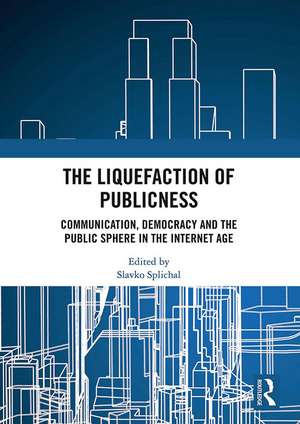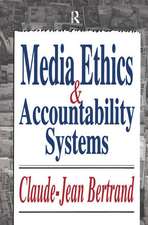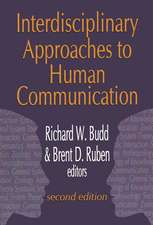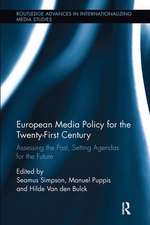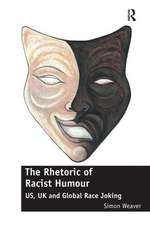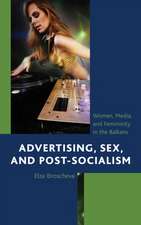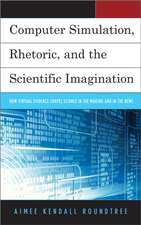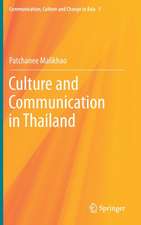The Liquefaction of Publicness: Communication, Democracy and the Public Sphere in the Internet Age
Editat de Slavko Splichalen Limba Engleză Paperback – 30 iun 2020
This book celebrates the 25th anniversary of the journal Javnost – The Public, bringing together internationally renowned scholars from 20 countries to discuss topical issues in contemporary media and communication research. It focuses on challenging issues of the changing nature of publicness and the public sphere in the internet age, issues of democracy and the crisis of public communication and the tasks of media and communication research as a social practice. It critically reflects on the democratisation crisis and the demise of popular and scholarly optimism, which the emerging internet inspired in early 1990s, when Javnost – The Public was founded.
| Toate formatele și edițiile | Preț | Express |
|---|---|---|
| Paperback (1) | 379.04 lei 6-8 săpt. | |
| Taylor & Francis – 30 iun 2020 | 379.04 lei 6-8 săpt. | |
| Hardback (1) | 764.20 lei 6-8 săpt. | |
| Taylor & Francis – 4 sep 2018 | 764.20 lei 6-8 săpt. |
Preț: 379.04 lei
Nou
Puncte Express: 569
Preț estimativ în valută:
72.53€ • 75.88$ • 60.25£
72.53€ • 75.88$ • 60.25£
Carte tipărită la comandă
Livrare economică 02-16 aprilie
Preluare comenzi: 021 569.72.76
Specificații
ISBN-13: 9780367586539
ISBN-10: 0367586533
Pagini: 286
Dimensiuni: 174 x 246 x 15 mm
Greutate: 0.52 kg
Ediția:1
Editura: Taylor & Francis
Colecția Routledge
Locul publicării:Oxford, United Kingdom
ISBN-10: 0367586533
Pagini: 286
Dimensiuni: 174 x 246 x 15 mm
Greutate: 0.52 kg
Ediția:1
Editura: Taylor & Francis
Colecția Routledge
Locul publicării:Oxford, United Kingdom
Public țintă
Postgraduate and UndergraduateCuprins
Part I: Publicness and the Public Sphere in the Internet Age 1. Publicness–Privateness: The Liquefaction of "The Great Dichotomy" 2. Debunking Deference: The Delusions of Unmediated Reality in the Contemporary Public Sphere 3. Media, Knowledge and Trust: The Deepening Epistemic Crisis of Democracy 4. Fake Democracy: The Limits of Public Sphere Theory 5. Visibility and the Public Sphere: A Normative Conceptualisation 6. Refeudalisation Revisited: The Destruction of Deliberative Democracy 7. Standpoint, Mediation and the Working-Class Public Sphere 8. Dissonant and Disconnected Public Spheres as Challenge for Political Communication Research 9. A Youth-Driven Virtual Civic Public Sphere for the Arab World 10. Family Feud: Who’s Still Fighting about Dewey and Lippmann? Part II: Democracy and the Crisis of Public Communication 11. The Crisis of Public Communication, 1995–2017 12. Democracy and the Internet: A Retrospective 13. Post-Globalisation 14. Modern Political Communication and Web 2.0 in Representative Democracies 15. Revisiting Digital News Audiences with a Political Magnifying Glass 16. Translation as Politics 17. The Alt-Right as a Community of Discourse 18. Post-Communism, Democratisation and the Media: (Nearly) Thirty Years On 19. Putin’s Slangy Newspeak as a Paradox of His Public Communication 20. Digital Media, Contentious Politics and Party Systems in Italy and Spain 21. The Detached Observer: On a Necessary Change to the Self-Image of Journalists in the Digital World Part III: Communication and Media Research in Scientific and Social Practice 22. The Double Hermeneutics of Communication Research 23. Fast-Capitalist Veils from Communication Theory for "The Public" and Its "Discourse" 24. Reframing the Paradox of Pluralism as a Communication Problem 25. New Technologies, Old Questions: The Enduring Issues of Communications Research 26. A Critical Perspective on the Post-Internet World 27. Communication Research: Resignation or Optimism? 28. On Human Communication 29. Studying Political Economies of Communication in the Twenty-First Century 30. Expanding the Epistemological Horizon: Institutionalised Visual Knowledge and Human Rights 31. Researching Fake News: A Selective Examination of Empirical Studies 32. Gendering Media Policy Research and Communication Governance
Notă biografică
Slavko Splichal is Professor of Communication and Public Opinion in the Faculty of Social Sciences at the University of Ljubljana, Slovenia and a fellow of the Slovenian Academy of Sciences and Arts, Ljubljana, Slovenia. He is Founder and Director of the European Institute for Communication and Culture and Editor of its journal Javnost - The Public.
Descriere
This book celebrates the 25th anniversary of the journal Javnost – The Public, bringing together topical discussions in contemporary media and communication research.
